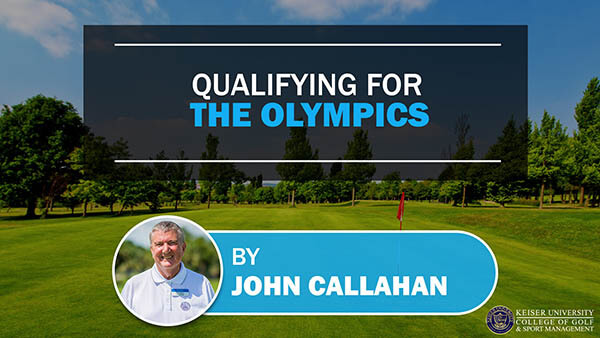
Qualifying for the Olympics Golf Team
Originally posted on https://collegeofgolf.keiseruniversity.edu/qualifying-for-the-olympics/
Golfers will qualify for the 2020 Olympics in Tokyo at the Kasumigaseki Country Club the same way they did for the 2016 games in Rio. The field will consist of 60 men and 60 women taken primarily from the Olympic Golf Rankings (OGR) with a limit of four golfers from any one country. We could get into the weeds about how the OGR differs from the World Golf Ranking (WGR) or how the four-person limit may mean that a top tier player such as the women’s defending gold medalist, Inbee Park from South Korea, maybe left home. However, my issues with the qualifying methodology come from a different perspective.
Why only 60 players and why limit the number of countries that can participate based on the OGR? I thought that one of the main purposes of returning golf to the Olympics was to foster interest in golf around the globe. Call me old fashioned, but I remember how the Canadian Cup, initiated in 1953 to foster interest in-game, had two-person teams from 37 countries by 1965. Olympic golf in 2016 had representatives from only 34 nations! Yes, the 1965 Canadian Cup had players from countries relatively new to the sport and certainly not “world-class” competitors. For example, Sweden’s two-person team (Ake Bergquist and Arne Werkell) finished 88 over par for 72 holes or an average of 83 per person per round. But I’m sure their participation in the Canadian Cup inspired many young Swedes to give golf a try. In the following decades, Sweden produced scores of champions including arguably the greatest female golfer of modern times, Annika Sörenstam.
The 1988 Calgary, Alberta, Canada Olympics is a good illustration of what the Olympic movement and spirit should be about. If you are old enough to remember these games, I bet the two things you remember most are the British ski-jumper “Eddie the Eagle” Edwards and the Jamaican bobsled team. Both finished last in their respective disciplines, but it could be argued that Eddie and the Jamaicans did more to raise interest in their sports than any of the Gold Medalists. In fact, referencing “Eddie the Eagle” while addressing the athletes at the closing ceremonies, the President of the Organizing Committee for the Olympic Games, Frank King, said, “You have broken world records. You have established many of your own personal bests, and some of you have even soared like an Eagle”
In 2012 Keiser University College of Golf had two students from Poland, Kamil Chojnicki and Mateusz Kniaginin who shared two post-graduate goals: 1) to become a member of the Professional Golfers Association of Poland (PGA Poland), and 2) have a chance to play in the 2016 Olympics representing their country. I’m glad to report they both achieved the first goal and are among what PGA Poland calls “Fully Qualified Golf Pros,” an elite group of only 38 professionals. The second goal was denied. Kamil and Mateusz didn’t get the chance to try to qualify for the Olympics because they did not play on any of the 20 eligible tours from which the OGR computes qualifying points.
Now Kamil and Mateusz may not have beaten other “Fully Qualified Golf Pros” within PGA Poland, but they would have had a great chance, both regularly score around par, much better than the Swedish Canadian Cup participants in 1965. In fact, nobody from Poland had a chance to qualify and have an opportunity to inspire future generations of Polish golfers. I believe that every nation should be allowed to send two representatives from their country based on their own qualifying criteria. That is the way the Canadian Cup handled it, and it worked. It helped spur interest in golf from areas of the globe that heretofore had little involvement with the sport.
A final thought, the Olympic Committee says they limit the number of players to 60 because of pace of play issues. Think about that for a minute. Tours around the world regularly run tournaments with 156 players in the field. Why limit an Olympic field to 60? Pace of play is always an issue but not any more so than any other tournament. The bottom line, let more players play. The “Eddie the Eagle” of golf is somewhere out there, let’s allow him or her to be found.
Litke, James (29 February 1988). “Golden light extinguished, but memories will live on.” Rome News-Tribune (N.Y.). AP.
If you’d like to study with John Callahan and other PGA Master Professionals, contact The College of Golf today.

